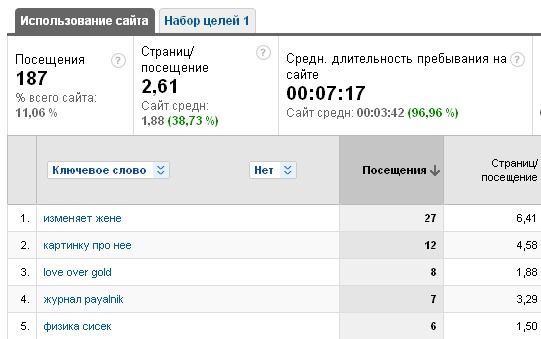Google Analytics as a cause of frequent cheating
As soon as LJ allowed installing the Google Analytics code on the diary pages, of course, I immediately turned on the counter. A very interesting feeling - as if the fog of war had cleared, it became clear where visitors came to my blog from and what interests them (for this we love web analytics, right?).
One of the most interesting reports on the site that I pay attention to is “Keywords”. These are requests from search engines that used to find the site: some of them are just funny, others can help understand the needs of users and figure out what to write about. In a word, the report is very useful.
At one point, I found that the most popular word used to come to my blog from search engines is “cheating on my wife.”

Scandals, intrigues, investigations! Of course, I went looking for myself in the issuance of Yandex at this request and did not find. But the next explanation that came to mind turned out to be true. I was able to understand what happened because I learned the properties of Google Analytics well, for example:
One of the most interesting reports on the site that I pay attention to is “Keywords”. These are requests from search engines that used to find the site: some of them are just funny, others can help understand the needs of users and figure out what to write about. In a word, the report is very useful.
At one point, I found that the most popular word used to come to my blog from search engines is “cheating on my wife.”

Scandals, intrigues, investigations! Of course, I went looking for myself in the issuance of Yandex at this request and did not find. But the next explanation that came to mind turned out to be true. I was able to understand what happened because I learned the properties of Google Analytics well, for example:
- Traffic sources in Google Analytics are tracked by visits, not unique visitors. If the same user comes to the site from Yandex three times, the search engine will count three clicks.
- The user who returns to the site without a referrer (visiting from a bookmark or from the address bar) is assigned the same source that he had before. For example, if I first opened a site using an advertising link, and then saved it in bookmarks and opened it again the next day, this visit will be counted as the second transition to advertising.
- Transitions from subdomains of search engines do not differ: for example, a user who logs in from Yandex search by pictures is indistinguishable from users who clicked from Yandex search through blogs.
- Each of my visits was added to the statistics of visits.
- Since I came from a bookmark, Google Analytics “remembered” that I had previously come from Yandex, and considered this a new keyword transition.
- Since all types of searches from the Yandex domain are considered by Google Analytics as visits from yandex.ru, I could not determine that the blog search was used.
- If it’s critical for your site what kind of search service visitors use (for example, regional Google domains or additional Yandex services), they must be added to the counter code forcibly. On this occasion, Daniil Azovskikh wrote an excellent article.
- If possible, filter the transitions of company employees, the site owner and other “friends”. This can be done by filtering by IP address, but it will be even more accurate to add a condition to the site code according to which the counter is simply not shown to the administrator. The same could be done in LJ.
- Always remember that statistics are counted by visits, and not by unique users. Then you will not be surprised, for example, that Analytics counts more clicks on contextual advertising Yandex.Direct than Yandex itself.
